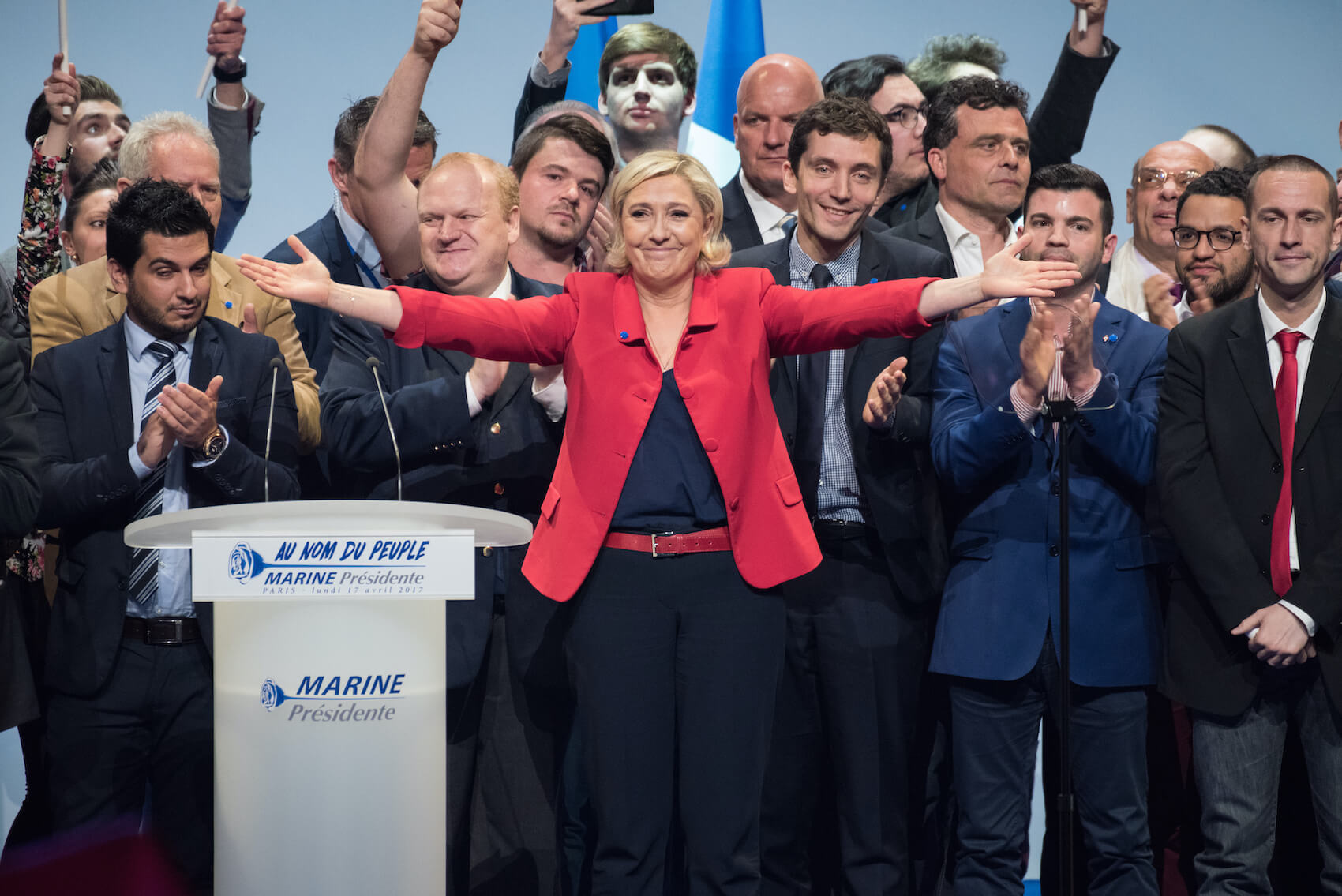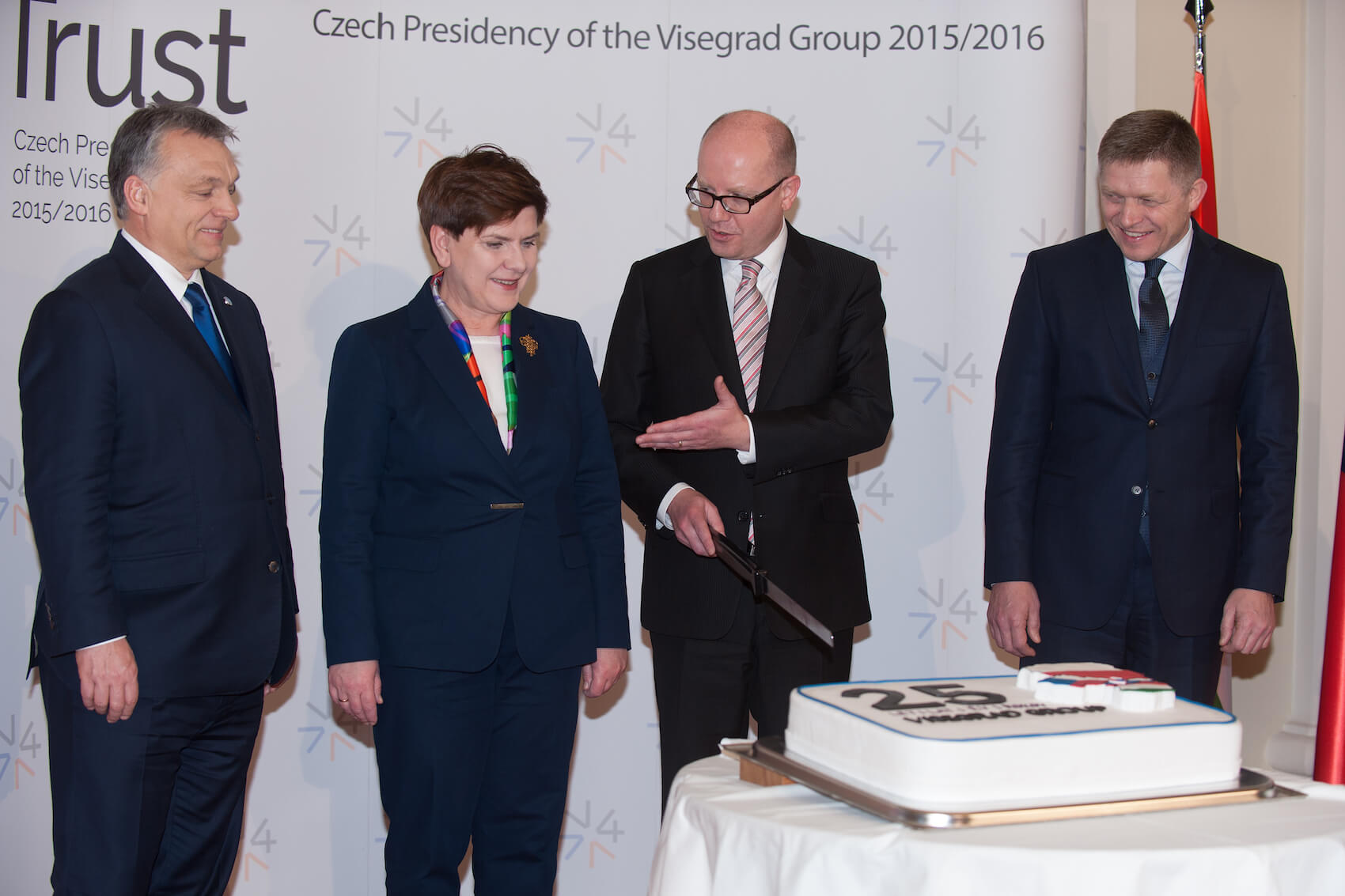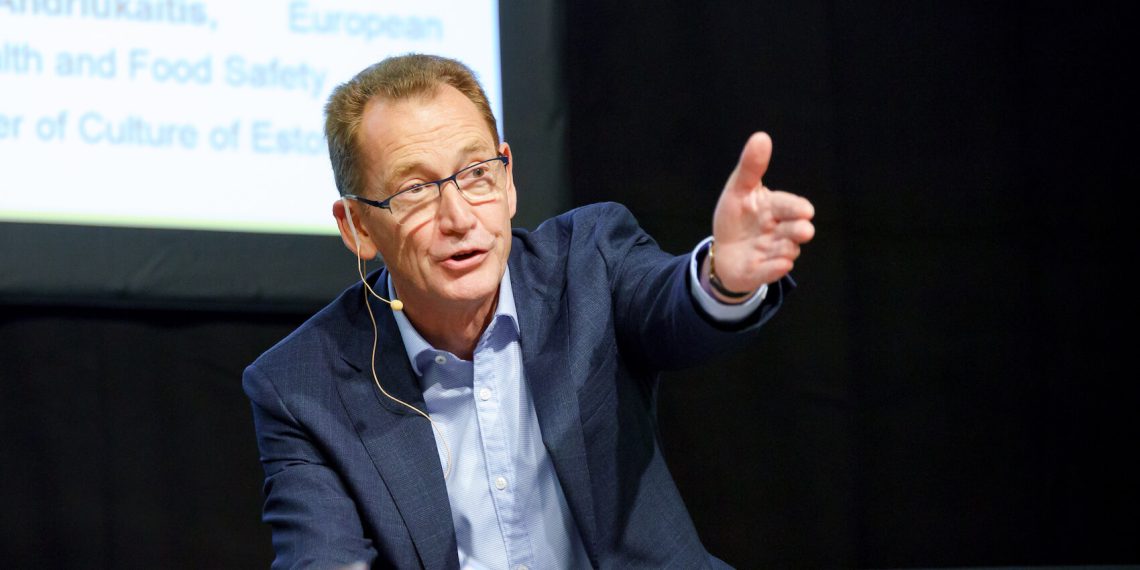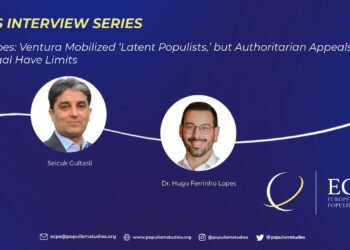As opinion polls indicate a potential surge in support for far-right parties in the European Parliament elections scheduled for June 6-9, Sir Graham Watson emphasizes the critical need to persuade younger people to vote. “In recent years, we have seen significant abstention among younger voters. This was a major factor in Brexit,” Watson explains. “We desperately need everyone eligible to vote, especially those over 18 across the European Union, to exercise their democratic rights. Perhaps the younger generation does not fully grasp that freedom must be actively used, or it can be lost. If they do not use their freedom to vote and participate in democratic society, they risk losing that freedom in the future,” he warns.
Interview by Selcuk Gultasli
In an exclusive interview with the European Center for Populism Studies (ECPS), Sir Graham Watson, a liberal politician and Advisory Board member of ECPS, emphasizes the urgent need for mainstream parties to intensify their efforts in the upcoming European Parliament elections. "It is particularly important to persuade younger people to go to the polls," Sir Watson asserts, highlighting a critical factor that influenced the Brexit vote. "In recent years, we have seen significant abstention among younger voters. This was a major factor in Brexit, where older voters, who largely supported leaving the EU, turned out in high numbers, while younger people, who favored remaining, did not vote in large numbers."
As opinion polls indicate a potential surge in support for far-right parties in the elections scheduled for June 6-9, Sir Watson shares his concerns about the implications for the European Union’s future. He acknowledges the far-right’s growing presence in countries like Germany and Italy, where parties such as Fratelli d’Italia and Lega Nord are gaining traction. "Clearly, the next Parliament will include a larger far-right group," Sir Watson notes. However, he believes that mainstream democratic forces will still hold a majority, provided they collaborate effectively to counteract the far-right’s influence.
Sir Watson, a former leader of the Liberal Group in the European Parliament, also addresses the broader threat posed by the far-right and populist radical right parties, arguing that their potential success does not signal the end of liberal democracy but represents a significant danger. "A lot of people think ‘Oh, well, it’s only the European Parliament. It’s not national parliaments.’ They underestimate the European Parliament’s role in shaping public policy in every Member State," he explains. Watson warns that the presence of nationalistic and anti-democratic forces could lead to the fragmentation of the EU and a rollback of social progress.
Highlighting the external threats to the EU, Watson points to Russia’s aggression in Ukraine and its financial support for far-right politicians like Salvini in Italy and Marine Le Pen in France. "The Russians are trying to destabilize the European Union to reestablish their hegemony on the continent," he warns. Sir Watson underscores the necessity for EU member states to recognize and respond to this threat.
Addressing strategies to boost voter mobilization, particularly among the youth, Sir Watson stresses the importance of leveraging technology and social media algorithms to counter the far-right’s influence. "We need to use this technology ourselves to get our message across," he says, emphasizing that mainstream parties must defend the principles of liberal tolerance and democracy more effectively.
As Sir Watson prepares to stand in Italy for the European Parliament elections, his commitment to combating the rise of the far-right and promoting European unity is clear. "We must persuade younger people to go to the polls," he reiterates, underscoring the critical role of voter participation in safeguarding the future of the European Union.
Here is the transcription of the interview with Sir Graham Watson with minor edits.
Mainstream Democratic Forces Need to Collaborate Much More Effectively

Many polls and pundits argue that there is a significant possibility of a far-right surge in the upcoming European Parliament elections scheduled for June 6-9. Given the current political climate and recent events in Europe, how likely do you think a far-right victory is, and what would be its implications for the future of the EU?
Sir Graham Watson: I think the far-right will certainly perform better than they have in the past. Opinion polls suggest their growth in several countries, particularly in Germany and Italy, where I’m a candidate. In Italy, we see strong support for Fratelli d’Italia and Lega Nord, both of which can be considered far-right parties. There’s also Vox in Spain and the far-right in the Netherlands. Clearly, the next Parliament will include a larger far-right group. The question is whether they will have a majority and if they can organize themselves well enough to influence policy. Currently, the far-right is divided among two or three different political groups, making them less effective. I believe mainstream democratic forces will still hold a majority in the European Parliament, but they will need to collaborate much more effectively to minimize the far-right’s impact.
If the far-right and populist radical right parties win in the upcoming elections, do you think this will signal the end of liberal democracy as we know it?
Sir Graham Watson: I don’t think it will signal the end of liberal democracy as we know it, but it does represent a far greater threat than most people realize. A lot of people think “Oh, well, it’s only the European Parliament. It’s not national parliaments.” Many dismiss the significance of the European Parliament, thinking it doesn’t impact national parliaments. They underestimate the European Parliament’s role in shaping public policy in every Member State and the influence a strong performance in European Parliament elections can have on national elections. I am very worried about the immediate future of the European Union because of the presence of forces that are not only nationalistic, which can lead to the fragmentation of the EU, but are also fundamentally anti-democratic and aim to reverse social progress achieved in many areas.
People Have Not Yet Fully Grasped How Dangerous The Situation Is

In an interview with The Guardian, you argued that the rise of the far-right and the threat Russia posed to the EU compelled you to accept the invitation to stand in Italy. How serious do you think the Russian threat to the EU is, and how do you assess the strong relations between Russia and far-right parties in Europe?
Sir Graham Watson: We see the military threat every day on our television screens in Ukraine. Although Ukraine is not a member state of the European Union, it is a candidate country, and Russia’s attack on Ukraine and attempts to seize more territory demonstrate that no European country is safe from expansionist policies. Alongside this, we see Russian money supporting figures like Salvini in Italy and Marine Le Pen in France, and previously Nigel Farage in the United Kingdom. The Russians are trying to destabilize the European Union to reestablish their hegemony on the continent. People have not yet fully grasped how dangerous this situation is.
There are stories in the European media that far-right voters are very well mobilized for the upcoming elections compared to the voters of mainstream parties. What strategies do you believe pro-European parties should adopt to increase voter mobilization, particularly among the youth?
Sir Graham Watson: Clearly, we, the mainstream parties, need to put much more effort into the campaign. It is particularly important to persuade younger people to go to the polls. In recent years, we have seen significant abstention among younger voters. This was a major factor in Brexit, where older voters, who largely supported leaving the EU, turned out in high numbers, while younger people, who favored remaining, did not vote in large numbers. We desperately need everyone eligible to vote, especially those over 18 across the European Union, to exercise their democratic rights. Perhaps the younger generation does not fully grasp that freedom must be actively used, or it can be lost. If they do not use their freedom to vote and participate in democratic society, they risk losing that freedom in the future.
European Council on Foreign Relations (ECFR)’s research in March argued that the agenda of the European Union will not be defined by far-right parties as they are divided on their aims and ambitions. Do you agree with this finding?
Sir Graham Watson: I’m not sure I agree with it, but I understand where they’re coming from. Their arguments suggest that the far-right is not sufficiently unified at the European level, and that the parties comprising the far-right groups in the European Parliament are not well-coordinated. These parties may not recognize the same priorities, whereas the democratic forces in the European Parliament tend to be well-organized, accustomed to working together, developing common agendas, and reaching agreements even when compromises are needed on policies such as energy and transport. In contrast, the far-right tends to be more splintered and less effective. However, we should not let studies indicating the far-right’s lack of effectiveness make us any less concerned about the potential consequences of a far-right victory.
President of the European Commission Should Be Elected Directly

As a former leader of the liberals and a candidate running in the EP elections, what are the basic promises you present to the electorate? What are your plans to combat the surge of far-right parties?
Sir Graham Watson: I think the most important thing is to make the European Union work properly. Currently, we have a Confederal Europe, where any country can veto important policies. For example, Viktor Orban can veto crucial developments in European defense policy needed to defend against Russia in Ukraine. We need majority voting by qualified majority in the Council of Ministers, rather than allowing individual states to have a veto. Additionally, we should see the President of the European Commission elected directly by the people, similar to how the President of the United States is elected. This would ensure a proper ideological debate during European elections and a President elected on a clear program for government. This is more understandable for most voters than the current situation, where individual parties present their programs, which are not always well understood.
It has been announced that the far-right Dutch politician Geert Wilders will be forming the next coalition in the Netherlands. Do you think this is a milestone in terms of far-right parties’ ability to form governments?
Sir Graham Watson: I believe they will not be forming a government on their own, as they don’t have the numbers to do so. We already have an example in Europe with a far-right party, the so-called Sweden Democrats, who are part of the governing coalition but have no ministers. They are part of the governing majority, but without ministerial positions. I hope we see a similar outcome in the Netherlands. I don’t think anyone is seriously considering Geert Wilders as Prime Minister, and I hope his party will not have any ministers. However, I believe parties should avoid participating in governments with the far-right if it is at all possible.
How concerned are you that mainstream parties might imitate far-right rhetoric to garner more votes? In other words, are you concerned that the values of far-right parties will be mainstreamed by center-right parties?
Sir Graham Watson: I’m very worried about what is happening within the European People’s Party (EPP), where member parties in some countries are shifting to the right on policy issues like immigration, abortion, and LGBTQ+ rights. They are doing this to try to protect their vote share, essentially saying, “We don’t want to lose votes to the far-right, so we’ll adopt their policies.” This approach is absolutely wrong. These parties need to defend the society built on principles of liberal tolerance against the far-right’s attacks. In other words, they need to advocate for their positions much more effectively rather than fearing voters on the far-right.
Democracy Is Now Being Undermined by Far-right Forces

The recent assassination attempt on Slovakian PM Robert Fico has raised concerns about political stability and violence in Europe. How do you think the EU should respond to such incidents to ensure the safety and security of its political leaders, including the populist radical right or far-right ones, and maintain democratic integrity?
Sir Graham Watson: I think this is a big challenge. As we saw in the 1930s—although few people remember that time directly—politics can become very nasty. During that decade, we witnessed the assassination of numerous mainstream politicians as the far-right gained power. I’m very concerned about the current situation, not only with the attempt on the life of Robert Fico but also with attacks on candidates in Germany and other countries. Through the European Union, we have established something rare and incredible in European politics: a peaceful, secure, stable, liberal democracy. This democracy is now being undermined by far-right forces, often financed by the Russians, and it’s something we must defend. That’s why I’m a candidate. It was not in my life plan to run again at my age, having already served 20 years in the European Parliament. But I’m so worried about what’s happening and the failure of young people to stand up against it that I’ve decided to confront people like Matteo Salvini directly.
Considering the potential long-term challenges that the EU faces, including the rise of soft and hard Euroscepticism, anti-European sentiments, and anti-EU political parties, what strategies do you recommend for maintaining the EU’s resilience, strengthening European unity, to protect democratic values and institutions across member states?
Sir Graham Watson: First, we need to communicate all the remarkable achievements of the European Union, many of which people take for granted. It’s not just about programs like Horizon for scientific cooperation or Erasmus for student exchanges. It’s also about having Airbus, a leading aircraft manufacturer that competes with Boeing, and world-leading pharmaceutical companies thriving due to Europe’s single market freedoms. In emergencies, such as a major terrorist attack, we can seamlessly move human blood supplies across borders. These are all results of laws adopted at the European level.
When I was in the European Parliament, I helped pass the European Arrest Warrant, allowing police and judicial services from different countries to collaborate in arresting criminals and tackling international organized crime. However, very few people understand these achievements. We must first help them recognize what Europe is capable of and what it has already accomplished, especially as we seek to grant Europe more powers to achieve even more.
Additionally, we need to be smarter and acknowledge that the far-right has succeeded by effectively using social media algorithms, an inexpensive but powerful way to influence people against the European Union. When you lose a battle, it’s often because your enemy has better technology. We need to leverage this technology ourselves to get our message across.


